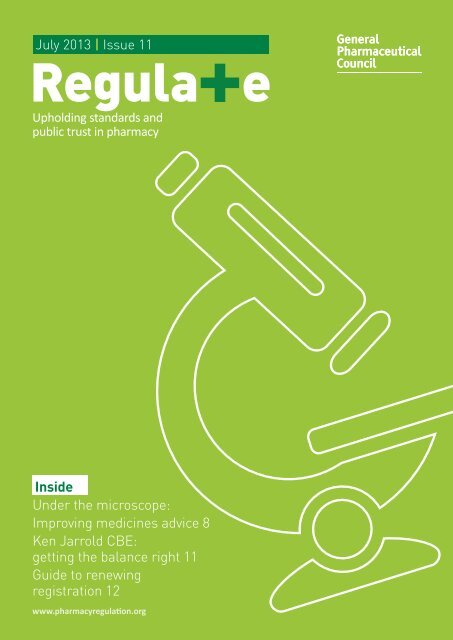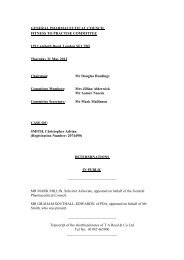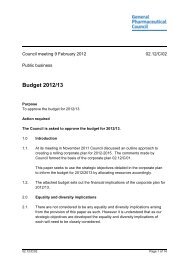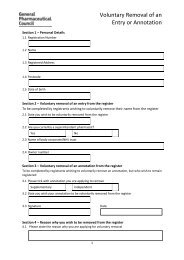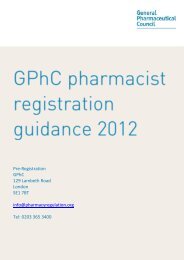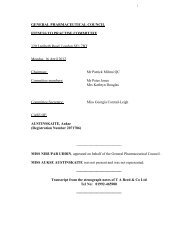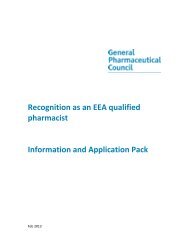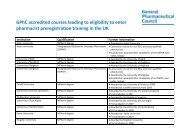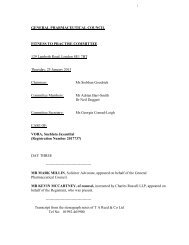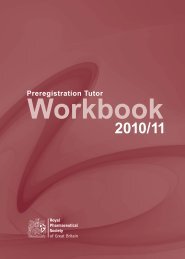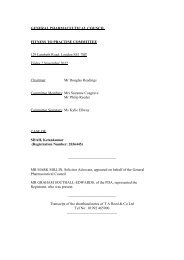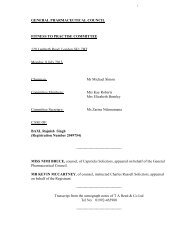Regulate July 2013.pdf - General Pharmaceutical Council
Regulate July 2013.pdf - General Pharmaceutical Council
Regulate July 2013.pdf - General Pharmaceutical Council
Create successful ePaper yourself
Turn your PDF publications into a flip-book with our unique Google optimized e-Paper software.
Registrant updatePayments toassociatesA range of people work with theGPhC as associates, like statutorycommittee members, legal and clinicaladvisers to statutory committees, theboard of assessors and accreditors/visitors. The associates play a valuablerole in maintaining the integrity andindependence of a range of key processes,including fitness to practise andeducation.After a review by our remunerationcommittee, the GPhC’s governing councilhas agreed to increase the fee paid tosome of these associates. In making theirrecommendations to council,the remuneration committee tookinto account the history of fee setting,benchmarking data from other regulatorsand similar bodies, and feedback fromstatutory committee staff.From June 2013:• members of our statutory committees,appointments committee, board ofassessors and accreditation teams willreceive £300 per day (an increase of£77)• fitness to practise committee andregistration appeals committee deputychairs will receive £486 per day (anincrease of £18)• fitness to practise committee andregistration appeals committee chairswill receive £589 per day (an increaseof £6).Duncan Rudkin, GPhC chief executive andregistrar, said:“These increases represent a one-offrealignment of a historical paymentstructure. They bring us into line withother regulators and help to ensure ourcompetitiveness in future recruitment.“We have a clear duty to deliver value formoney to our registrants, while carryingout our statutory duties effectively. Todo this, we need to ensure we maintaina good quality associate workforce, tobenefit registrants and the public.”You can find out more about theincrease in fees at:www.pharmacyregulation.org/sites/default/files/GPhC%20<strong>Council</strong>%2013%20June%202013%20agenda%20and%20papers.pdfJoin ourgoverningcouncil -here’s howWe are recruiting to six vacancies on ourgoverning council, including a new chair.Applicants for council member roleshave until 13 September to apply.The GPhC has a 14-member councilwhich sets the strategic directionand objectives for the organisationand checks that the organisation isdelivering these objectives. Seven ofthe council members are registeredpharmacy professionals and seven arelay people.Including the chair, there are threevacancies for pharmacy professionals(who must be pharmacists or pharmacytechnicians registered with the GPhC),and three vacancies for lay members.At least one of the appointees (eitherlay or registrant) must live or work inScotland.The vacancies have arisen as thechair and five other members of thecurrent council have terms of officeending in March 2014. These memberscan reapply if they choose. <strong>Council</strong>members can serve a maximum of eightyears in a 20-year period.The recruitment campaign seekscandidates from across Great Britainwho can bring a fresh perspective to thecouncil, both from within and outsidepharmacy. The GPhC is particularlyseeking candidates with experienceof the wider world of commerce orwith knowledge and understanding ofeducation and training for pharmacyprofessionals.A separate recruitment process is beingundertaken to recruit a new chair.Applications for the position closedon 14 June and an independent panelled by Olivia Grant OBE will take theselection process forward.We expect to announce the successfulcandidate in September this year.Bob Nicholls, our current chair, hasdecided not to seek re-appointment fora second four-year term. Mr Nichollswill continue in his role until early 2014.Interviews for the council memberroles will take place after the chair isappointed, and the council memberappointments are expected to beannounced in January 2014. Theappointees will then take up their rolesin April 2014.To find out more about the councilmember recruitment process, includinghow to apply, go to:www.gphccouncilmembers.comUpholding standards and public trust in pharmacy 5
Improving medicines adviceWorkingtogetherto improvemedicinesadvicePatients would benefitfrom improvementsin medicines adviceprovided by communitypharmacy, an eventorganised jointly bythe GPhC and theRoyal <strong>Pharmaceutical</strong>Society has been told.The event was organised to considerchanges in light of a recent survey bythe consumer magazine, Which?, andacademic research which concludes thatthe management of consultations withpatients in community pharmacy is“sub optimal”.The event brought together more than80 representatives from industry, trade,manufacturing and professional bodies,as well as patients, to discuss currentpractices in medicines advice and how thisarea of pharmacy could be improved.A summary of the Which? findings waspresented by Joanna Pearl, Senior HealthResearcher at Which?. Dr MargaretWatson from the University of Aberdeenpresented a summary of publishedresearch studies carried across the UK andinternationally to assess the managementof consultations in communitypharmacies.Duncan Rudkin listens to other delegatesDuncan Rudkin, GPhC chief executive andregistrar, said:“The Which? investigation shines alight on both good and bad practice inpharmacy and includes some troublingresults about the quality of advice givenon some visits.“I hope that everyone who attended theevent will reflect on what they have heardand think about what their organisationscan do to improve this area of pharmacyfor patients.“We are going to repeat this event withinour organisation so we can identify whatwe can do, and are asking all organisationsinvolved in this event to do the same. Wewill report back on the progress that hasbeen made early in 2014.“Each organisation has a role to play inimproving medicines advice to patients,including making sure that all pharmacystaff receive the right education andtraining and the appropriate supervision.”8 Regula+e: <strong>July</strong> 2013 | Issue 11
Improving medicines adviceSummary ofWhich? findingsWhich? visited 122 communitypharmacies across the UK which wererandomly selected, but included across-section of supermarket, chain andindependent pharmacies.• In each pharmacy their ‘mysteryshoppers’ used one of threescenarios: a request for Imigranmigraine medication, a request forsomething to treat diarrhoea aftera tropical holiday and a request forPantoloc medication for heartburn• This year’s investigation was arepeat of earlier investigations intocommunity pharmacy previouslycarried out in 2004 and 2008• Overall there was an increase in thenumber of visits rated unsatisfactoryfrom 34% in 2008 to 43% in 2013but Which? advised that this resultwas skewed by the Pantoloc scenarioresults, where 71% of the visits wererated unsatisfactory• The other two scenarios showed asmall improvement since 2008• The Which? investigation in2013 found similar trends tothe 2008 investigation. Visits toindependents were more likely tobe rated unsatisfactory than visitsto multiples or supermarkets. Visitswere significantly more likely to berated unsatisfactory if the pharmacyassistant dealt with the wholeconsultation/ transaction and thepharmacist did not get involved atany point• Which? has also undertaken similarinvestigations, which involve using‘mystery shoppers’, in dentalpractices, GP practices and opticians.For more detail on the investigation,go to:www.which.co.uk/news/2013/05/can-you-trust-your-local-pharmacysadvice-319886/Dr Margaret Watson from the University of Aberdeen presents aresearch summaryDelegates discussing the researchUpholding standards and public trust in pharmacy 9
Around Great BritainHealthEducationEnglandworking withthe regulatorsHow the new body, responsible forfunding and coordinating educationand training in health in England, HealthEducation England (HEE), should workDevelopingpartnershipworking inScotlandWe are working with a number ofnational healthcare bodies in Scotland toexplore opportunities for collaborativeworking including:Progress onjoint workingin WalesAs part of its response to the recentreport by Robert Francis QC into thecare of patients at Mid Staffordshire NHSFoundation Trust, the Welsh Governmenthas highlighted the importance ofthe sharing of information betweeninspection and regulatory bodies.with healthcare regulators, including theGPhC, was discussed and clarified during aparliamentary debate on amendments tothe Care Bill.Earl Howe, Health Minister in the Lordsand the Care Bill’s sponsor, clarified thesearrangements in a debate about how HEEwould work with royal colleges and otherprofessional bodies.Earl Howe said:“Many organisations have an interest inthe development of health professionals,ranging from local employers in the NHSthrough to national organisations suchas the professional regulators... andprofessional bodies.• sharing information and discussingpolicy developments with HealthImprovement Scotland• developing a Memorandum ofUnderstanding (MOU) with NHSCounter Fraud Services Scotland.This agreement will provide aframework to safely share informationbetween organisations, as well asfacilitating the sharing of experience,expertise and information on policydevelopment work• discussing partnership working,information sharing and how weThe government has set out theimportance of focusing on improvedinformation sharing and collaborativeworking.In Wales, the GPhC is part of theConcordat Forum group of all healthrelated review, audit and inspectionbodies where best practice is shared andrelevant intelligence exchanged.We are currently developing memorandaof understanding and information sharingprotocols with Healthcare InspectorateWales, NHS Counter Fraud Services and“To carry out its role effectively, HEE andthe Local Education and Training Boards(LETBs) need to tap into all this knowledgeand expertise.“I can reassure the Committee that HealthEducation England is already requiredto work with the professional regulatorsand medical royal colleges to obtain theiradvice on the exercise of its functions.”Duncan Rudkin, chief executive andregistrar, said:“As the regulatory body responsible fordefining and assuring the standards foreducation and training of pharmacists andpharmacy technicians, we are committedto working collaboratively with HEE tomake sure pharmacy education continuesto be fit for purpose.”avoid unnecessary duplicationof work with National EducationScotland (NES), which is responsiblefor supporting NHS services inScotland by developing anddelivering education and training.We are particularly focusing onpre-registration training• discussing ways of working togetherin future with the Scottish PublicServices Ombudsman and the CareInspectorate.Local Health Boards, which the WelshGovernment has said is also a key priorityfor them.We will progress work to develop clearprotocols across the various bodies sothat accountabilities and joint workingarrangements are clearly defined whileseeking to keep the regulatory burden onpharmacists and providers to a minimum.10 Regula+e: <strong>July</strong> 2013 | Issue 11
Balancing medicines law and regulationKen JarroldCBE: getting thebalance rightKen Jarrold CBE, chair ofthe rebalancing initiativeprogramme board, givesan insight into the board’sprogress and plans for thefuture. The GPhC’s chairand chief executive sit onthis board.The UK Governments have establisheda programme board to examine therespective scope of legislation andregulation and the interface betweenthem. I am the independent chair ofthe board and the members includerepresentatives of patients and thepublic, the four chief pharmaceuticalofficers, representatives of the regulatoryand professional bodies for pharmacy,community and hospital pharmacistsand pharmacy technicians, andrepresentatives of the Medicines andHealthcare products Regulatory Agency(MHRA) and the Department of Health.The board has met twice and we havebegun to get a feel for the importanceand complexity of our work. We want tomake a real difference to pharmacists andpharmacy technicians, enabling them toplay their full part in serving patients andthe public.We are still discussing the phasing of ourwork. However, it seems likely that ourfirst task will be to review the legislationon dispensing errors and examine the bestway of rebalancing from the legislationto regulation. Other important issuesinclude:• responsible pharmacist - examiningthe scope for reducing the level ofdetail within regulations• pharmacy superintendent – exploringgreater clarity of role, accountabilityand competence• hospital pharmacy regulation– considering the regulatoryarrangements for pharmacyprofessionals operating from hospitalpharmacies• pharmacy supervision – developingproposals on supervision and thepreparation, sale and supply ofmedicinesWe are aiming to consult on proposalsin relation to dispensing errors in theautumn with the objective of changesin legislation by the end of 2014 andimplementation in 2015. However, thosewith a detailed knowledge of these issueswill be well aware of the challenge thatwe are facing.We are determined to engage widelyand we have established a ‘partnersforum’ which will meet as soon as wehave made sufficient progress to justifycalling together the wide range of peopleinvolved.We are very conscious that we are doingour work in the context of many otherchanges, including:• <strong>General</strong> <strong>Pharmaceutical</strong> <strong>Council</strong> (GPhC)work on standards• reviews by professional bodiesincluding evaluation of the impactof the Responsible PharmacistRegulations• MHRA led review of medicinelegislation sanctions and penalties• developments in the devolvedadministrations• the response to the Francis Inquiry• the Law Commission review ofprofessional regulation• cross government work on the“Red Tape Challenge”We are increasingly conscious of theimportance of our work and of the degreeof difficulty involved. With the help of allthe stakeholders we will do our best tomake a real difference.Upholding standards and public trust in pharmacy 11
Our guide to renewalsA time to renewFor the majority of pharmacy professionals and pharmacyowners on our register, it will soon be time to look atrenewing your annual registration. If your renewal is dueby 31 December, then you have until 31 October to completethat renewal.Renewal can be completed online or over the phone, in foursimple steps.Pharmacistsand pharmacytechniciansStep 1 Check your detailsBefore you start, you should checkthat your details are up to date in ouronline system, myGPhC. If you havechanged your registered address, emailor telephone number since you lastrenewed your registration, you shouldupdate your details at: www.mygphc.orgIf you have changed your name, you canfind a Change of details form at:www.pharmacyregulation.org/renew.Once completed, return it to us at:info@pharmacyregulation.orgStep 2 Renew your registrationYou will need your registration numberand renewal number (which you canfind on your renewal letter, reminderemail or by ringing our customer serviceteam on 0203 365 3400) and your creditor debit card details.To renew online, go to:www.mygphc.org and follow theon-screen prompts.To renew by telephone, call 0845872 5114, and follow the spokeninstructions.Step 3 Make your declarationsYou need to make two sets ofdeclarations. The first is a declarationthat you are fit to practise withoutrestrictions. The second is a declarationthat you intend to practise as apharmacist or pharmacy technician inGreat Britain, you have and will continueto undertake continuing professionaldevelopment (CPD) and that theinformation provided in your applicationis complete, true and accurate.You can view the text of both renewaldeclarations at:www.pharmacyregulation.org/renew.Copies of the declaration can also befound attached to your renewals letter.Whether you are renewing online orvia the automated telephone service,you will be asked to make both thesedeclarations.Step 4 Pay the feeThe annual fee for pharmacists is £240;and for pharmacy technicians is £108.You can make arrangements to payannually or quarterly by direct debit.Further information about setting up adirect debit is available at:www.pharmacyregulation.org/renewIf you choose to pay by credit card thereis a surcharge of 2 per cent of yourrenewal fee.Your receipt will be available from:www.mygphc.org within 24 hours ofmaking your payment - receipts are notsent by post.Missing your renewal dateShould you miss the renewal date, yourentry will be removed from the registerthe day after the expiry date of yourregistration. You are not able to practiseunless you are registered.Registrants who do not seek to renewtheir registration should completean application for voluntary removalinstead. This form can be found at:www.pharmacyregulation.org/registration/changes-your-registration/leaving-registerIf you mean to renew but fail to do soby the renewal date, you can seek tobe restored to the register. It is worthnoting that the fee for restoration ismore than double the fee for renewingyour registration.If you need more information about therenewals process, please go to:www.pharmacyregulation.org/renewor call our customer service team on020 3365 3400.12 Regula+e: <strong>July</strong> 2013 | Issue 11
Our guide to renewalsPharmacyownersIf you are a pharmacyowner, your renewalletter will include asummary of the eligibilityand requirements forregistering a pharmacy inGreat Britain.Read thestandards forregisteredpharmaciesbeforerenewingA pharmacy can only be registered, orhave its registration renewed, if theservice model includes at least one ofthe following:• the sale of Pharmacy (P) medicines• the supply of P medicines orPrescription Only Medicines (POMs)against prescriptions• the supply of P medicines orPrescription Only Medicines (POMs)against prescriptions written byveterinary practitioners for thetreatment of animals under the‘cascade’.If this is not the case, then the ownershould complete a voluntary removalform for any pharmacies which nolonger meet the criteria for registrationrenewal. This form can be found at:www.pharmacyregulation.org/registration/registration-pharmacypremises/voluntary-removalpharmacy-premisesAll pharmacy owners and superintendentsneed to be aware that there are newstandards for registered pharmacies thathave replaced interim standards.The new standards came into operation atthe start of October last year. All ownersand superintendents were sent copies ofthe new standards at that time.A link to the standards will be sent toowners and superintendents as part ofthis year’s renewal pack from the GPhC.This year you will be asked to declarethat you have read these standards andhave undertaken to meet them. You mustread the standards before signing thatdeclaration.Owners and superintendents (wherethe owner is a corporate entity) areaccountable for meeting these standards.We are currently developing a newinspection model to reflect our focus onoutcomes and the new standards.The registration renewal deadlinefor the vast majority of pharmacies is31 October.A pharmacy based in a hospital thatonly supplies medicines in the course ofthe business of that hospital has alwaysbeen exempt from the requirement toregister with us and this continues to bethe case. A service model that consistssolely of the sale of medicines ongeneral sale (GSL medicines) is also noteligible to be registered by the GPhC.For more information about eligibilityand registration criteria, includinganswers to frequently askedquestions, go to:www.pharmacyregulation.org/renewpharmaciesThis new model will be rolled out laterthis year.You can find an online copy of thestandards for registered pharmacies at:www.pharmacyregulation.org/standardsand if you need more information, youcan ring our customer service team on020 3365 3400.Upholding standards and public trust in pharmacy 13
Our guide to renewalsRenewal forpharmacyownersThe simple four step renewal process forregistered pharmacies is:Step 1 Check your detailsBefore you start, please check thatthe contact address you have givenus is the most appropriate for futurecorrespondence from us. If it is not,please send the new details to:info@pharmacyregulation.orgStep 2 Make your declarationsYou need to make an annual declarationwhich covers all your registeredpharmacies for the year. Before youmake a declaration, you should notethe summary we have issued about theeligibility and legal requirements forrenewal of a pharmacy. This summaryis included on page 13 here and in yourrenewals letter. Or you can go to:www.pharmacyregulation.org/renewpharmaciesBy signing the declaration, you areconfirming that you have read the“standards for registered pharmacies”and have undertaken that you will meetthose standards.Step 3 Pay the feeThe annual fee is £221 for eachregistered pharmacy being renewed.You can pay by either BACS or credit/debit card. If paying by BACS the GPhC’sdetails are as follows:Account number: 45165548Sort code: 60-60-04Name of bank:Nat WestYour owner number must be quoted asthe reference when paying by BACS.For more information about setting up adirect debit, go to:www.pharmacyregulation.org/renewpharmaciesStep 4 Return your declarationRead the declaration form carefully(there is a copy attached to yourrenewals letter). Then complete, signand return your declarations to:The <strong>General</strong> <strong>Pharmaceutical</strong> <strong>Council</strong>,Pharmacy Renewals – CustomerServices Team, 129 Lambeth Road,London SE1 7BT, to be received by thecustomer services team before therenewal date for your pharmacy orpharmacies.Missing your renewal dateShould you miss the renewal date, yourpharmacy entry will be removed fromthe register the day after the expiry dateof registration. You are not able to carryout the business of a retail pharmacyunless the pharmacy is registered.Owners who do not seek to renewthe registration of their pharmacyshould instead complete an applicationto voluntarily remove the pharmacyfrom the register at:www.pharmacyregulation.org/registration/registration-pharmacypremises/voluntary-removalpharmacy-premisesIf you mean to renew but fail to do soby the renewal date, you can seek torestore your pharmacy to the register.It is worth noting that the fee forrestoration of each registered pharmacyis £789, more than triple the registrationrenewal fee.If you need more information aboutthe renewals process, please go to:www.pharmacyregulation.org/renewpharmaciesor call our customer serviceteam on 020 3365 3400.14 Regula+e: <strong>July</strong> 2013 | Issue 11
Fitness to practise: determinationsFitness topractise:determinationsIf a fitness to practise committeedetermines that a registrant’s fitness topractise is impaired, the committee mayimpose a sanction that is proportionateto the conduct that has been foundproven. This may include, for example,issuing a warning, placing conditions onthe individual’s registration, suspension ofregistration or, in the most serious cases,erasing the individual from the register sothat they can no longer practice.The matters listed here include theregistrant’s registration number, date ofdetermination and the sanction.Determinations of the facts and additionalinformation about the hearings can befound on our website at:www.pharmacyregulation.org/search/search_decisionsFitness to PractiseCommittee determinationsJalota, Satish Kumar, 2021459Determination date 2 April 2013Remain on the register with conditionsfor 12 months, with a review to be heldbefore the end of this periodPuri, Ashoo, 2057631Determination date 3 April 2013Removal from the registerBhatia, Aruna, 2021159Determination date 8 April 2013Review hearing in respect of conditionspreviously imposed on registration:order of conditions varied and extendedfor a further 18 monthsGlackin, Brendan Ambrose, 2055187Determination date 10 April 2013Review hearing: suspension extendedfor a further 12 monthsKinchin, Matthew, 2073968Determination date 19 April 2013Removal from the registerPatel, Sanjeev Narendrabhai, 2045156Determination date 29 April 2013Removal from the registerMarkham, Allison, 5003792Determination date 29 April 2013Suspension for 12 months, with areview before expiryWillingham, Gary Peter, 5008851Determination date 29 April 2013Review hearing: 12 month suspensionpreviously imposed on registration.Suspension extended for a further 12months, with a review before the endof that periodBrown, Neil Peter, 5016073Determination date 3 May 2013Removal from the registerRandeva, Jagraj Singh, 2037301Determination date 7 May 2013Review hearing: suspended for a periodof 2 monthsMistry, Joyti, 5001489Determination date 13 May 2013Removal from the registerNash, Timothy Charles, 2063208Determination date 21 May 2013Suspended for a period of 11 monthsIdowu, Folake Bridget Iyabo, 2053418Determination date 22 May 2013Suspension for 12 months, with areview before the end of that periodCarpenter, Beverley Jane, 2026482Determination date 23 May 2013Warning with adviceJones, Simon David Trevor, 2057742Determination date 28 May 2013Review hearing: suspended withconditions for a period of 3 years, witha review before the end of that periodNally, Edwin, 2074553Determination date 30 May 2013Warning given: that the registrant“must understand that he must notdo anything in his private life thatwill lessen public confidence in theprofession, and he must be aware thatit is of the greatest importance thathe reports to the council anythingthat has to be reported and needs tobe investigated including any criminalconvictions.”Dick, John Brown Barry, 2022354Determination date 30 May 2013Review hearing: remain on the registerwith conditions for a further period of12 monthsSmith, Christopher Adrian, 2074490Determination date 10 June 2013Review hearing: suspension continuedfor a period of 6 monthsUpholding standards and public trust in pharmacy 15
Fitness to practise: determinationsInterim order hearingsJones, Colin, 2023538Determination date 2 April 2013Interim suspension for 18 monthsSaheed, Rafif, 2078284Determination date 8 April 2013Interim suspension for 12 monthsHealy, Paul Edward, 2081443Determination date 8 April 2013Interim suspension for 12 monthsRichards, Timothy George, 2042355Determination date 15 April 2013Interim suspension for 18 monthsCarpenter, Beverley Jane, 2026482Determination date 17 April 2013Interim order review: interim conditionspreviously imposed on registration toremain in forceAli, Hazrat, 2068629Determination date 17 April 2013Interim order review: suspension toremain in forceMiah, Mohammed Anwar, 2065399Determination date 17 April 2013Interim order review: suspension toremain in forceOnwughalu, Lynne Sidoh, 2068609Determination date 25 April 2013Interim order review: suspension toremain in forceAbdul-Razzak, Mohammed El-Hadi,2078728Determination date 25 April 2013Interim suspension for 12 monthsMcDonald, Paul Andrew, 2058320Determination date 30 April 2013Interim suspension for 12 months withimmediate effectRichardson, James William, 2069234Determination date 8 May 2013Interim suspension for 18 monthsJaglin, Stephene Gilbert, 2047556Determination date 13 May 2013Interim order review: remain withconditions continuedMiah, Miraj Nanu, 2052475Determination date 14 May 2013Interim order review: interim conditionspreviously imposed on registration tobe varied and to remain in forceBarnes, Trevor, 2015957Determination date 20 May 2013Interim suspension for 18 months withimmediate effectRathour, Ashok Singh, 2064817Determination date 24 May 2013Interim order review: suspension toremain in forceAkhtar, Tenveer, 2057499Determination date 28 May 2013Interim suspension for 18 monthsGray, Elizabeth, 5004149Determination date 28 May 2013Interim order review: suspension toremain in forceJackson, Rosalyn Helen, 2026055Determination date 28 May 2013Interim suspension for 18 monthsJohnson, Lyn Ann, 2078232Determination date 31 May 2013Interim order review: suspension orderchanged to conditions with immediateeffectTran, Thang, 2071818Determination date 6 June 2013Interim order review: interimsuspension previously imposed onregistration to remain in forceCheema, Jaspal Singh, 2038866Determination date 7 June 2013Interim order review: interimsuspension previously imposed onregistration to remain in forceFaizollahi, Bita, 2047300Determination date 10 June 2013Interim suspension for 12 monthsMacGregor, Simon John, 2055084Determination date 11 June 2013Interim order review: interim conditionsto be replaced with an interimsuspension order for the remainderof the term of the previous order withimmediate effectHirani, Ghanshyam Kanji, 2026341Determination date 14 June 2013Interim suspension for 12 monthsSimpson, Jacqueline Elizabeth, 2036103Determination date 14 June 2013Interim suspension for 18 monthsMcDougall, Alan, 2026449Determination date 14 June 2013Interim order review: suspension toremain in forceRasool, Hussain Jamal, 2068258Determination date 20 June 2013Interim order review: suspension toremain in forceArif, Iftikar, 2054938Determination date 24 June 2013Interim order review: suspension toremain in forceWood, Janice, 5000692Determination date 24 June 2013Interim order review: remain on theregister with conditions to continuePlease check the GPhC register forwarnings for individual registrants at:www.pharmacyregulation.org/registers16 Regula+e: <strong>July</strong> 2013 | Issue 11
Fitness to practise: updateGuidance onwriting fitnessto practisedeterminationsWe have produced new guidance for our fitnessto practise committee, to help make sure that thedecisions made in fitness to practise cases, and thereasoning behind them, are recorded clearly.The outcome of fitness to practise cases are summarised in documents referred to as“determinations”. The new guidance outlines how decisions made by the fitness topractise committee during a hearing should be explained in a determination document.The guidance is available as a PDF download from our website at:www.pharmacyregulation.org/raising-concerns/hearings/committees/fitnesspractise-committee/ftp-committee-guidanceUpholding standards and public trust in pharmacy 17
Fitness to practise: learningFitness topractise:learningWe receive concerns aboutpharmacy professionals froma wide variety of sources.Some of the concerns fallbelow our threshold criteriaand so do not get referredon to our investigatingcommittee or fitness topractise committee. Casesare only referred to thesecommittees where there isreason to believe that theregistrant’s fitness to practisemay be impaired. We arekeen to share learning froma variety of cases to improvepractice and for registrantsto better understand how wedeal with these matters.Stealing medical devicesA pharmacy technician stole medicaldevices from his workplace and then soldthem over the internet, the fitness topractise committee was told.The pharmacy technician was employedat a medical centre which provides arange of medical services for armed forcespersonnel. He was authorised to orderstock for the medical centre.18 Regula+e: <strong>July</strong> 2013 | Issue 11The pharmacy technician had a log-in toan online system to order orthopaedicknee braces costing £315 each. He wasalso able to use the system to indicatewhen an item had been delivered,triggering payment to the supplier.The supplier of the knee braces receivedan email from a member of the pubiccomplaining that they were overchargingpeople by listing a recommended retailprice of £389 per brace. The emailexplained that these same braces wereavailable significantly cheaper on eBay.An employee of the supplier used his owneBay account to contact the person sellingthe braces on eBay asking if any morebraces would become available. The eBayseller responded saying that there wouldbe more for sale.The knee brace supplier received anorder from the medical centre for twobraces. The items were marked to identifythem and dispatched. Shortly after, theemployee was contacted by the eBayseller, who offered to sell him knee bracesas a private sale through the site. Theemployee declined.The knee brace supplier then contactedthe police, who searched the pharmacytechnician’s house and found eight kneebraces that he had ordered through theonline system at his workplace.The pharmacy technician was convictedof theft, and ordered to pay a fine andcompensation.The pharmacy technician claimed he hadinitially ordered two braces as he thoughtthey might be useful to the physiotherapyservice at the medical centre. When herealised they were not suitable, he wasembarrassed and decided to sell them.The committee did not accept his claim, asthe braces were expensive items to orderwithout a specific request. And he had notspoken to the physiotherapist in chargeabout the items either when he orderedthem or when they arrived.The committee found that his actionswere “premeditated acts of dishonestycommitted in breach of trust”, and that hisfitness to practise was impaired.The pharmacy technician was removedfrom the register.Key points• acting with honesty and integrityis a fundamental part of being apharmacy professional• you should not abuse yourposition of trust as a pharmacyprofessional.Stealing medicines fromthe pharmacyA pharmacist has been removed from theregister after a history of stealing drugsfrom the pharmacies at which he worked.At times he had been in charge at thepremises at which he worked.At a fitness to practise hearing, thepharmacist explained that he had beguntaking drugs several years before hequalified, initially taking low dose codeinepreparations which he used recreationally.This misuse escalated over the years toa continued and regular intake of mildopiates. By the time the pharmacistwas a pre-registration trainee, he wasstealing codeine and dihydrocodeinefrom the pharmacy where he worked andconsuming these drugs in the eveningafter work.For a short period after he registered asa pharmacist, he stopped stealing drugs.But three months later he started work ata supermarket pharmacy. Shortly after, 30morphine sulphate tablets (a schedule 2controlled drug) were found to be missingfrom the controlled drugs cabinet at thepharmacy.The pharmacist admitted to the managerthat he had taken some tablets. Heinitially claimed he had only taken 10tablets and that he had done this forsomeone else, who he named.
Fitness to practise: learningThe pharmacist was initially suspendedfrom his job and his employer informedthe police, who arrested and interviewedhim. The pharmacist was convicted of theftat a crown court. There were no furthercharges relating to the supply of controlleddrugs as it was found that he had liedabout taking the drugs for someone else,falsely incriminating a third party.The committee found that the pharmacist’sactions were potentially harmful topatients as the pharmacist may havedispensed medicines under the influenceof opiates, and that he demonstrated a lackof insight as he continued to steal drugswithout reflecting on his behaviour, orseeking help.The committee commented that themisconduct was committed when thepharmacist “was, at times, in charge ofpharmacy premises”.The pharmacist was removed from theregister.Key points• acting with honesty and integrityis a fundamental part of being apharmacy professional• do not abuse your position oftrust as a pharmacy professional• respond honestly and openly tocomplaints• make sure your actions do notpresent a risk to patient care orpublic safety• an early, full and truthfuladmission to wrongdoing showsinsight.Conviction for stealingmedicinesA pharmacy technician had used herpersonal log-in to access a computercontrolledrobot to steal medicines from ahospital pharmacy, the fitness to practisecommittee heard. She had been caughtand convicted of theft.Medicines in the hospital pharmacywere stored in a computer-controlledrobot which was used for dispensingprescriptions. Each member of staff hada personal log-in to the system whichallowed them to request the robot toselect a quantity of medicine, which wasdispatched down a numbered chute forthe staff member to pick up and label forthe patient. The system maintainedstock records.There were found to be a number ofdiscrepancies between the computerstock record and the pharmacytransactions record of medicinesrequested on the pharmacy technician’slog-in.The police were alerted and the pharmacytechnician was stopped on her wayhome after she had finished work atthe hospital. She had two packets ofLevothyroxine tablets in her pockets.The police searched the pharmacytechnician’s house and found quantities offour different prescription only medicines(POM) and one pharmacy (P) medicine.She denied having supplied medicines toanyone else or having taken the medicinesfrom the dispensary for her own use.The pharmacy technician was consequentlyconvicted of theft at a crown court.The committee were satisfied thatthe pharmacy technician’s behaviour“presents a risk to patients and thepublic” and that “her conduct brings theprofession of pharmacy technician intodisrepute”.The committee also noted that in the timethat had passed since the events tookplace, the pharmacy technician had notpresented “any evidence to suggest herfitness to practise had been remedied”.The pharmacy technician was removedfrom the register.Key points• you should be honest and actwith integrity• do not take medicines for yourpersonal use when they do notbelong to you• take steps to improve the qualityof your professional practice• reflect on how your practice orbehaviour should be improved orchanged and take any necessaryactions to remedy it.You can find out more about the role of the investigating committee at:www.pharmacyregulation.org/raising-concerns/hearings/committees/investigating-committeeAnd about the fitness to practise committee at:www.pharmacyregulation.org/raising-concerns/hearings/committees/fitness-practise-committeeOur threshold criteria can be found at:www.pharmacyregulation.org/sites/default/files/The%20threshold%20criteria.pdfUpholding standards and public trust in pharmacy 19
Check that a pharmacy professional is registered:www.pharmacyregulation.org/registersCopies of Regula+e are available to download fromour website www.pharmacyregulation.org/publicationsWe welcome feedback and comments onthis publication which can be sent toregulate@pharmacyregulation.org<strong>General</strong> <strong>Pharmaceutical</strong> <strong>Council</strong>129 Lambeth Road | London | SE1 7BTTelephone: 020 3365 3400Email: info@pharmacyregulation.orgDesigned and produced by wearetangerine.co.uk


